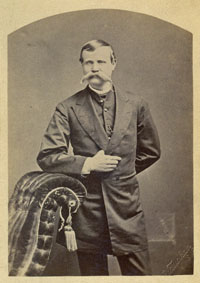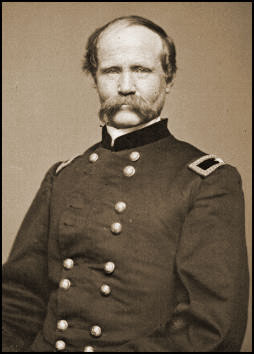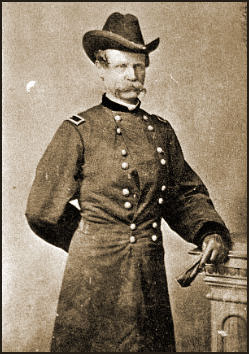 Brigadier General Robert Seaman Granger
Brigadier General Robert Seaman Granger

Brigadier General Robert Granger (Day) |

Brigadier General Robert Granger (WayBackMachine) |

Brigadier General Robert Granger (WayBackMachine) |
Union General in American Civil War
Notes:
• Son of Ebenezer Granger (1781-1822) and Eliza Seaman (1785-). - American Civil War Generals
• "Granger, Robert S., brigadier-general, was born in Zanesville, Ohio, May 24, 1816, was graduated at the United States military academy in 1839 and saw his first active service in the Seminole war in Florida, 1840-42. He was subsequently for two years assistant instructor in tactics at West Point, and served in the Mexican war, winning promotion of captain, Sept. 8, 1847. He afterwards served on the Texas frontier and on April 27, 1861, was captured by the Confederate commander on the Texas coast and paroled. While on parole he organized and prepared for the field a brigade at Mansfield, Ohio, and then, being exchanged in Aug., 1862, was commissioned in September brigadier-general of Kentucky troops. He engaged with Confederate troops at Shepherdsville, Lebanon Junction and Lawrenceburg, was for his action in the last named battle brevetted colonel in the regular army, and on Oct. 20, 1862, he was commissioned brigadier-general of U. S. volunteers. He commanded a division and, during 1863, the districts of Nashville and Middle Tennessee successively, and in the first part of 1864 prepared Nashville as a depot of supplies. He then commanded the District of Northern Alabama, and while there captured Gen. Philip D. Roddey's camp, drove Gen. Joseph Wheeler out of middle Tennessee and defended his district against the raid of Gen. Forrest, and Decatur, Ala., against the army of Gen. Hood. He was brevetted brigadier-general in the regular army for these services and was awarded the brevet of major-general U. S. A. for services during the war. He commanded in northern Alabama during the occupation, in 1865, was promoted lieutenant-colonel U. S. A., on June 12 of that year; colonel, Aug. 16, 1871, and was placed on the retired list, Jan. 16, 1873. Gen. Granger died in Washington, D. C., April 25, 1894." - American Civil War Generals
• September 30, 1864: "General Grainger came up from Decatur, and he and his officers are having a consultation in the courthouse before dinner.... [Later] The Rebels are thundering at the gates...drawn up in line of battle across the Meridianville Pike, on the edge of town...General Buford demanded an unconditional surrender. Gen. Grainger replied that he would 'bum the town first, and that he would fight him there, or in the fort' [but] he would give all the citizens two hours to get out of town." - Eden
• May 7, 1865: "Major General R. S. Granger has had published rules that will govern the Freedmen in this district: The Freedmen will not be permitted to live in idleness- are required to find employment...or report to the Contraband Camp and be put to work. Those employed on plantations are required to faithfully perform the labor for which they have contracted. All contracts will be made in writing... subject to examination by Military Officers. No Freedman will be detained or held to labor by any person who has not previously made with him a contract for services. Freedmen who have worked on abandoned plantations, or who have been permitted to work for planters who have stayed at home, will not... be turned off without fair compensation, as judged by a Military Officer." - Eden
• "Granger was born in Zanesville, Ohio . He graduated from the United States Military Academy , placing 28th in the class of 1838. Granger became a first lieutenant of infantry in 1839. He served as an officer in the Seminole War , and was assistant instructor of tactics at West Point in 1843-44. During the Mexican-American War , Granger was promoted to captain on September 8, 1847. When the war ended, he was assigned to a series of posts on the Texas frontier.
With the outbreak of the Civil War and the secession of Texas in early 1861, he was captured with Major Sibley's command on April 27. He was paroled with the stipulation that he not serve in the field again until August 1862, when he was formally exchanged. During this period, he was promoted to major on September 9, 1861, and organized an infantry brigade at Mansfield, Ohio . He was the commandant of the troops at Louisville, Kentucky.
On September 1, 1862, following his exchange, he was commissioned brigadier general of Kentucky volunteers, and commanded the Kentucky state troops. He saw action in a series of small engagements-Shepherdsville, Lebanon Junction, and Lawrenceburg, for which he was brevetted as a colonel in the Regular Army. He received his commission as brigadier general of U. S. volunteers on October 20, 1862, and commanded a division. In 1863, he returned to administrative duty, commanding the Districts of Nashville and Middle Tennessee. In early 1864, he superintended the defenses and organized the depot at Nashville. He was then assigned to the command of the District of Northern Alabama, and was engaged in the capture of General Roddy's camp, in the expulsion of Joseph Wheeler from middle Tennessee, and in the defense against Nathan Bedford Forrest 's raid. In October 1864, he defended Decatur, Alabama against John B. Hood 's army, made a sortie on the Confederate siege-works, and received the brevet of brigadier general in the Regular Army for these services.
He commanded in northern Alabama in 1865 during the occupation. He was brevetted major general in the Regular Army for his services during the war and was promoted lieutenant colonel on June 12, 1865 and colonel on August 16, 1871. Granger was placed on the retired list January 1, 1873.
He died in Washington, D.C." - Wikipedia
• "Pre-War Profession Graduated West Point 1838, garrison duty, Seminole war, instructor at West Point, Mexican war.
War Service April 1861 captured in Texas, exchanged a year later, Brig. Gen. of Kentucky volunteers, October 1862 appointed Brig. Gen. of Volunteers, camp and garrison duties, resisted Wheeler, Forrest and Roddey.
Brevet Promotions Brig. Gen. U.S.A. March 13 1865, Maj. Gen. U.S.V. March 13 1865, Maj. Gen. U.S.A. March 13 1865.
Post War Career Army service, garrison duty, superintendent of General Recruiting Service, retired 1873." - GrapeVine
• General Granger is woven into many aspects of Chadick's journal. These were complicated times. In some cases, she wrote of his courtesy. But this was a war zone, and in some cases she reports fear for what he might do. Anyone interested in General Granger would find this journal useful. - Chadick & Rohr
• His family was in Huntsville. At one point in the journal, a local woman went to his wife to discuss conditions. Their presence might have been an extra motivation to defend the city against the Confederate forces, however. - Chadick & Rohr
Related Links:
The Following Pages Link to this Page:
• Chadick & Rohr
• Eden
| Nickname: | R. S. |
| Born: | May 24, 1816, Zanesville, Ohio |
| Died: | April 25, 1894, Washington, DC |
Notes:
• Son of Ebenezer Granger (1781-1822) and Eliza Seaman (1785-). - American Civil War Generals
• "Granger, Robert S., brigadier-general, was born in Zanesville, Ohio, May 24, 1816, was graduated at the United States military academy in 1839 and saw his first active service in the Seminole war in Florida, 1840-42. He was subsequently for two years assistant instructor in tactics at West Point, and served in the Mexican war, winning promotion of captain, Sept. 8, 1847. He afterwards served on the Texas frontier and on April 27, 1861, was captured by the Confederate commander on the Texas coast and paroled. While on parole he organized and prepared for the field a brigade at Mansfield, Ohio, and then, being exchanged in Aug., 1862, was commissioned in September brigadier-general of Kentucky troops. He engaged with Confederate troops at Shepherdsville, Lebanon Junction and Lawrenceburg, was for his action in the last named battle brevetted colonel in the regular army, and on Oct. 20, 1862, he was commissioned brigadier-general of U. S. volunteers. He commanded a division and, during 1863, the districts of Nashville and Middle Tennessee successively, and in the first part of 1864 prepared Nashville as a depot of supplies. He then commanded the District of Northern Alabama, and while there captured Gen. Philip D. Roddey's camp, drove Gen. Joseph Wheeler out of middle Tennessee and defended his district against the raid of Gen. Forrest, and Decatur, Ala., against the army of Gen. Hood. He was brevetted brigadier-general in the regular army for these services and was awarded the brevet of major-general U. S. A. for services during the war. He commanded in northern Alabama during the occupation, in 1865, was promoted lieutenant-colonel U. S. A., on June 12 of that year; colonel, Aug. 16, 1871, and was placed on the retired list, Jan. 16, 1873. Gen. Granger died in Washington, D. C., April 25, 1894." - American Civil War Generals
• September 30, 1864: "General Grainger came up from Decatur, and he and his officers are having a consultation in the courthouse before dinner.... [Later] The Rebels are thundering at the gates...drawn up in line of battle across the Meridianville Pike, on the edge of town...General Buford demanded an unconditional surrender. Gen. Grainger replied that he would 'bum the town first, and that he would fight him there, or in the fort' [but] he would give all the citizens two hours to get out of town." - Eden
• May 7, 1865: "Major General R. S. Granger has had published rules that will govern the Freedmen in this district: The Freedmen will not be permitted to live in idleness- are required to find employment...or report to the Contraband Camp and be put to work. Those employed on plantations are required to faithfully perform the labor for which they have contracted. All contracts will be made in writing... subject to examination by Military Officers. No Freedman will be detained or held to labor by any person who has not previously made with him a contract for services. Freedmen who have worked on abandoned plantations, or who have been permitted to work for planters who have stayed at home, will not... be turned off without fair compensation, as judged by a Military Officer." - Eden
• "Granger was born in Zanesville, Ohio . He graduated from the United States Military Academy , placing 28th in the class of 1838. Granger became a first lieutenant of infantry in 1839. He served as an officer in the Seminole War , and was assistant instructor of tactics at West Point in 1843-44. During the Mexican-American War , Granger was promoted to captain on September 8, 1847. When the war ended, he was assigned to a series of posts on the Texas frontier.
With the outbreak of the Civil War and the secession of Texas in early 1861, he was captured with Major Sibley's command on April 27. He was paroled with the stipulation that he not serve in the field again until August 1862, when he was formally exchanged. During this period, he was promoted to major on September 9, 1861, and organized an infantry brigade at Mansfield, Ohio . He was the commandant of the troops at Louisville, Kentucky.
On September 1, 1862, following his exchange, he was commissioned brigadier general of Kentucky volunteers, and commanded the Kentucky state troops. He saw action in a series of small engagements-Shepherdsville, Lebanon Junction, and Lawrenceburg, for which he was brevetted as a colonel in the Regular Army. He received his commission as brigadier general of U. S. volunteers on October 20, 1862, and commanded a division. In 1863, he returned to administrative duty, commanding the Districts of Nashville and Middle Tennessee. In early 1864, he superintended the defenses and organized the depot at Nashville. He was then assigned to the command of the District of Northern Alabama, and was engaged in the capture of General Roddy's camp, in the expulsion of Joseph Wheeler from middle Tennessee, and in the defense against Nathan Bedford Forrest 's raid. In October 1864, he defended Decatur, Alabama against John B. Hood 's army, made a sortie on the Confederate siege-works, and received the brevet of brigadier general in the Regular Army for these services.
He commanded in northern Alabama in 1865 during the occupation. He was brevetted major general in the Regular Army for his services during the war and was promoted lieutenant colonel on June 12, 1865 and colonel on August 16, 1871. Granger was placed on the retired list January 1, 1873.
He died in Washington, D.C." - Wikipedia
• "Pre-War Profession Graduated West Point 1838, garrison duty, Seminole war, instructor at West Point, Mexican war.
War Service April 1861 captured in Texas, exchanged a year later, Brig. Gen. of Kentucky volunteers, October 1862 appointed Brig. Gen. of Volunteers, camp and garrison duties, resisted Wheeler, Forrest and Roddey.
Brevet Promotions Brig. Gen. U.S.A. March 13 1865, Maj. Gen. U.S.V. March 13 1865, Maj. Gen. U.S.A. March 13 1865.
Post War Career Army service, garrison duty, superintendent of General Recruiting Service, retired 1873." - GrapeVine
• General Granger is woven into many aspects of Chadick's journal. These were complicated times. In some cases, she wrote of his courtesy. But this was a war zone, and in some cases she reports fear for what he might do. Anyone interested in General Granger would find this journal useful. - Chadick & Rohr
• His family was in Huntsville. At one point in the journal, a local woman went to his wife to discuss conditions. Their presence might have been an extra motivation to defend the city against the Confederate forces, however. - Chadick & Rohr
Related Links:
• American Civil War Generals - Union Army , vol. 8.
• Chadick & Rohr - Incidents of the War: The Civil War Journal of Mary Jane Chadick, by Nancy M. Rohr, 2005.
• Congressional Serial Set - From the U. S. Government Printing Office, 1892. A Google search from Granger yields over one hundred references.
• Day - Douglas Turner Day's Blog titled "Piedmont Blues" covers family history including a page referencing Robert Granger.
• Eden - Eden of the South: A Chronology of Huntsville, Alabama, 1805-2005, collected by Robert Reeves, edited by Raneé G. Pruitt, 2005, pages 52 & 55.
• GrapeVine - Military summary
• WayBackMachine - Photos
• Wikipedia - Biographical information
The Following Pages Link to this Page:
• Chadick & Rohr
• Eden